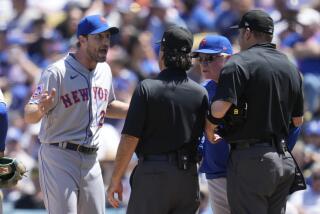Bonds named in test reports
The first player to reportedly test positive under baseball’s new amphetamine ban is Barry Bonds, the one most prominently associated with a federal investigation into steroid abuse -- and the one on the verge of breaking one of the sport’s most cherished records.
Bonds’ test result from last season was first reported Thursday by the New York Daily News. Although the disclosure revived concern about whether players could trust promises of confidentiality in drug testing, the San Francisco Chronicle reported Thursday that Bonds himself shared news of the test result within the San Francisco Giants’ clubhouse.
“Barry is the guy who went around telling everybody he tested positive,” a baseball source told the Chronicle.
Bonds initially blamed the positive test on a substance he took from the locker of teammate Mark Sweeney, the papers reported.
Bonds issued a statement Thursday in which he did not confirm, deny or address the positive test but did apologize to the Giants and their fans in general and Sweeney in particular.
“He is both my teammate and my friend,” Bonds said. “He did not give me anything whatsoever and has nothing to do with this matter, contrary to recent reports.”
Under baseball’s current drug policy, players testing positive for amphetamines are not publicly identified after a first offense but are subject to counseling and additional testing. Players are suspended 25 games upon a second positive test and 80 games upon a third.
Players testing positive for steroids are suspended 50 games for a first offense and 100 games for a second offense.
Sweeney often stood up for Bonds in interviews last season; he paid for engraved champagne glasses to toast Bonds in May, after the slugger passed Babe Ruth and moved into second place on the all-time home run list, according to MLB.com.
“He did not give anything to anybody and he doesn’t have anything illegal,” the agent for Sweeney, Barry Axelrod, told the Associated Press.
The disclosure thrusts more turbulence into Bonds’ flight toward the record. He needs 22 home runs to pass Hank Aaron atop the all-time list.
But he went virtually unwanted as a free agent this winter, and the Giants finally agreed Dec. 7 to bring him back for one year, at $16 million.
However, the contract has yet to be finalized because of reported disputes over whether the team would continue to provide clubhouse access to Bonds’ associates and could penalize him if legal issues force him to miss games.
A San Francisco grand jury is investigating whether Bonds committed perjury in 2003 when he testified he had not knowingly used steroids. In December, an appellate court ruled prosecutors in the case could have access to the names of about 100 players who tested positive for steroids in 2003, a year in which players were promised test results would remain confidential. The players’ union vowed to challenge the ruling.
One union official on Thursday called the disclosure of Bonds’ positive amphetamine test “disconcerting” but wouldn’t confirm or deny the result.
Baseball began testing for amphetamines last season, with 30 stimulants on the banned list. Gary Wadler, a New York physician and advisor to the World Anti-Doping Agency, said baseball officials could best attack amphetamine use by releasing which stimulants resulted in positive tests -- and how many -- without violating the confidentiality of first offenders.
“The Bonds thing is really a metaphor for a much bigger problem,” Wadler said. “You need to quantify the problem. That kind of information is very helpful if you’re going to seriously address this.”
Rob Manfred, baseball’s executive vice president in charge of labor relations, said the drug policy prevented him from disclosing how many players tested positive, and for which stimulants.
That information is shared, he added, with medical advisors selected jointly by the commissioner’s office and the union.
“There’s no real need to make that information public,” he said.
*
More to Read
Go beyond the scoreboard
Get the latest on L.A.'s teams in the daily Sports Report newsletter.
You may occasionally receive promotional content from the Los Angeles Times.











